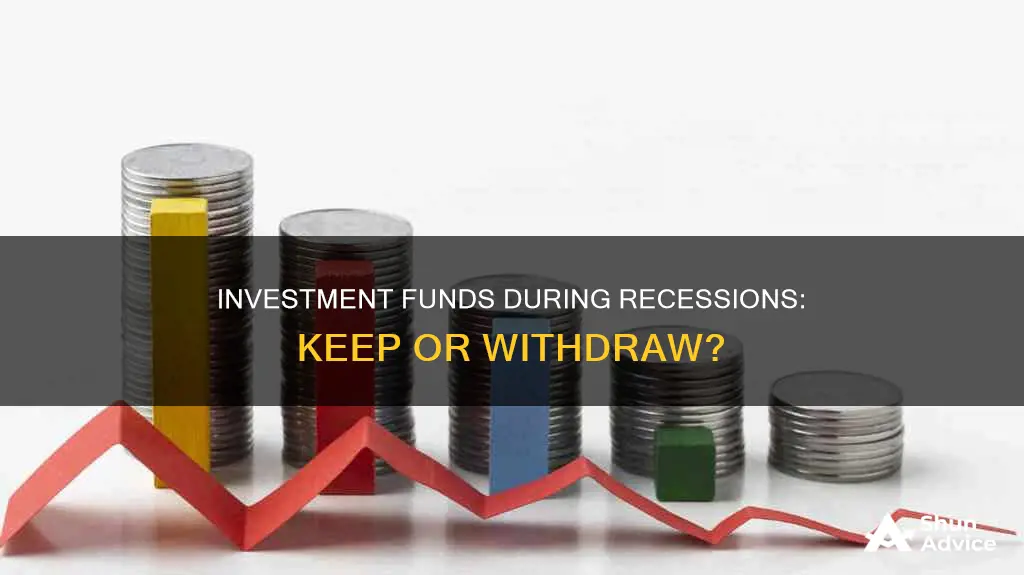
The question of whether to keep money in investment funds during a recession is a complex one, and the answer depends on a variety of factors, including your financial situation, risk tolerance, and investment goals. While some investors choose to pull their money out of the market during a recession to avoid further losses, others see it as an opportunity to buy assets at a lower price and potentially score higher returns in the long run. Here's a look at some of the arguments for and against keeping your money in investment funds during a recession.
Arguments for keeping money in investment funds during a recession:
- Buying during a recession: A recession can be a good time to buy stocks or other assets at a lower price, with the expectation of higher returns in the future as the market recovers.
- Long-term perspective: Historical data shows that the market has always bounced back from downturns, so investing during a recession can be a good opportunity to take advantage of lower prices and focus on long-term gains.
- Diversification: Holding on to your investments during a recession can help diversify your portfolio and reduce the impact of short-term volatility.
- Dividend stocks: Investing in dividend-paying stocks or funds can provide a source of income during a recession, as these companies tend to be more stable and continue paying dividends even during economic downturns.
Arguments against keeping money in investment funds during a recession:
- Risk aversion: Some investors choose to move their money out of stocks and into less volatile investments, such as bonds or cash, to reduce the risk of further losses.
- Emergency funds: It's generally recommended to have an emergency fund covering at least three to six months' worth of living expenses before considering investing during a recession.
- Market timing: Trying to time the market by selling stocks before a recession and buying again at the bottom can be risky and difficult to get right.
- Volatility and emotions: The volatility of the market during a recession can be emotionally challenging, and it can be difficult to stick to a long-term investment strategy.
What You'll Learn

Cash is king
"Cash is king" is a common refrain during recessions, and for good reason. Here are some arguments for why cash is king during economic downturns:
Liquidity and Financial Preparedness
Having cash on hand provides liquidity, which is crucial during recessions when job loss or unaffordable bills are a real threat. A solid cash account gives you the financial flexibility and confidence to navigate uncertain times. This is especially important for single-income households, who may want to save 6-9 months' worth of expenses.
Interest Rates and Savings
With inflation at record highs, central banks are raising interest rates. This means that holding cash in savings or money market accounts can offer higher returns than in previous low-interest rate environments.
Low-Risk and Peace of Mind
Cash-based accounts are typically insured and offer low (or no) risk compared to stocks, crypto, and other volatile investments. You know that $100 deposited today will be there tomorrow, which is not always the case in the stock market.
Buying Opportunities
Recessions often see the price of stocks, bonds, real estate, and other assets drop. Having cash on hand allows you to snap up these discounted investments and take advantage of buying opportunities.
Diversification
Adding cash to your investment portfolio increases diversification. Cash doesn't have to mean physical currency; it can include money market accounts, mutual funds, certificates of deposit, and short-term interest-bearing investments.
However, the "cash is king" argument has its drawbacks. Here are some reasons why cash might not always be king:
Temptation to Spend
One downside of keeping cash is the temptation to spend it. In a recession, it can be hard to resist dipping into your cash reserves for relief or a treat, such as a night out or a new gadget.
Inflation Erosion
Even with higher interest rates on savings, inflation can still eat away at your purchasing power. If inflation is running at 8.5%, a savings account with a 4% interest rate means you're still losing 4.5% in real terms.
Insurance Limits
Insurance on cash-based accounts often has limits, typically $250,000 per person per institution or $500,000 per joint account. If you save more than this and the institution fails, you could lose the excess.
Missed Opportunities
Holding too much cash can mean missing out on potential returns elsewhere. Stocks and other riskier investments offer higher potential rewards, and by holding too much cash, you may miss out on market growth and volatility.
Tax Implications
Interest and dividend payments on cash and cash-adjacent investments are often taxed sooner than capital gains on stocks. With stocks, you only pay taxes when you sell at a gain, whereas interest income is taxed annually.
Wealthfront's Investment Account: Index Fund or Not?
You may want to see also

Defensive stocks
During recessions, defensive stocks can help protect your portfolio. They are shares in companies that sell essential goods and services, such as food, electricity, water, healthcare, and consumer staples. These companies tend to be more stable during the various phases of the business cycle as their products are in constant demand.
Examples of defensive stocks include:
- Procter & Gamble
- Johnson & Johnson
- Philip Morris International
- Coca-Cola
- B&G Foods Inc
- They offer similar long-term gains to other stocks but with lower risk.
- They help to reduce portfolio volatility.
- They are a good option for less experienced investors or those who are risk-averse.
- They provide a steady revenue stream through dividends.
However, there are also some disadvantages to defensive stocks:
- They often lead to smaller gains during bull markets.
- They may become overvalued during a recession as lots of people snap them up.
Fidelity Mutual Funds: A Smart Investment Choice?
You may want to see also

Dollar-cost averaging
The benefits of dollar-cost averaging are that it helps to smooth out the impact of price volatility and can make it easier to stick to your investment plan. When the share price is high, your fixed investment will buy you fewer shares, and when the price is low, it will buy you more. This strategy helps to reduce the risk of investing at the 'wrong' time and can help investors avoid big short-term losses. It also removes the emotion from investing, as you are investing at predetermined intervals, rather than trying to time the market.
However, one downside of dollar-cost averaging is the opportunity cost of holding extra cash. If you plan to invest cash over a longer period, you may miss out on dividends and income during this time.
Midcap Funds: Worth the Investment Risk?
You may want to see also

Dividend-yielding investments
Dividend stocks are shares of a company that splits a portion of its profits with shareholders based on the number of shares they own. During a recession, these stocks can provide a cushion for your portfolio, and even if a company's stock price falls, it may continue to pay dividends.
When looking for dividend-yielding investments, consider the following:
- Consistency in paying or increasing dividends, which indicates good corporate governance.
- A solid track record of stable or rising dividend payments.
- A high dividend yield combined with a low payout ratio, indicating the company can sustain dividend payments during tough times.
- The company's current and future cash requirements—ensure they have enough surplus cash to distribute dividends.
Another option is to invest in dividend ETFs, which are made up of companies known for routinely paying strong dividends.
It's important to note that yield shouldn't be the sole factor when deciding on dividend-yielding investments. High yields often come with additional risk, and a high dividend yield can be a warning sign of low investor enthusiasm or company trouble.
L&T India Value Fund: Worth Investing?
You may want to see also

Actively managed funds
Research shows that most actively managed funds outperformed their peers by 4.5% to 6.1% per year in down markets after adjusting for risk and expenses. However, it's important to remember that active fund performance can be difficult to predict since there is no guarantee of beating the market.
When considering actively managed funds during a recession, it's crucial to keep in mind the higher fees associated with them. These fees can get expensive, especially for certain types of actively managed funds. Therefore, investors need to carefully evaluate the potential benefits against the costs involved.
Additionally, it's worth noting that passive investing, which involves buying and holding indexes for the long term, can also be considered during a recession. Passive funds have significantly lower fees since there is no active management required. While they may track the market down during a recession, they are well-positioned to rebound in the future.
In conclusion, actively managed funds can be a viable option during a recession, but investors should carefully weigh the potential benefits against the higher fees involved. It may also be wise to consider a mix of both active and passive investing strategies to optimise returns and manage risk effectively.
Growth Funds: Smart 401k Investment Strategy?
You may want to see also







